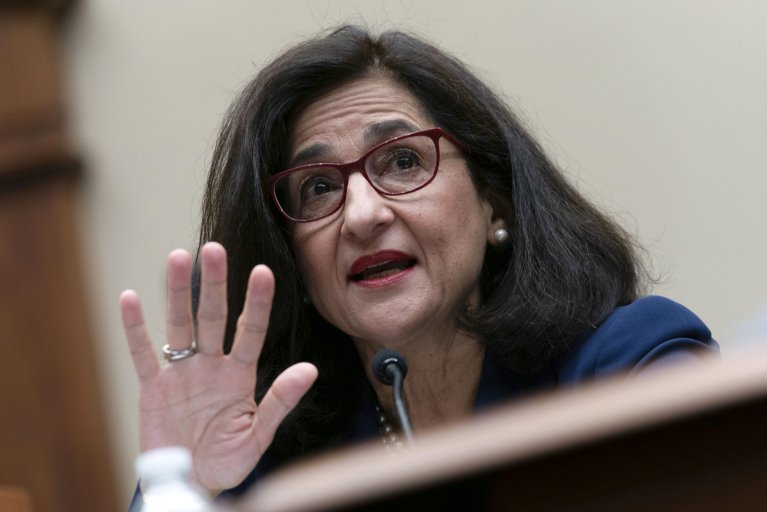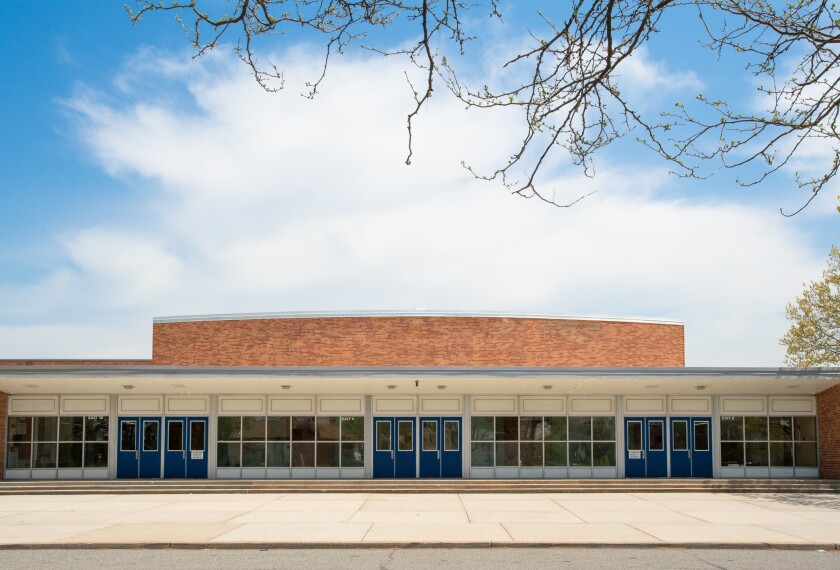The resignation of Columbia University President Minouche Shafik has been welcomed by some students and professors.
Shafik resigned from her position on Wednesday after a tumultuous tenure that saw her face heavy criticism over her handling of student protests against Israel's war in Gaza.
Students set up a pro-Palestinian protest encampment at Columbia in April to demand the university divest from companies they said were enabling the war.
Shafik authorized police to sweep the encampment and arrest more than 100 students on April 18, a move that inspired similar protests at college campuses nationwide. Columbia also cracked down on campus protests by suspending students and canceling classes.
In late April, police in riot gear stormed a building occupied by protesters, forcefully arresting demonstrators. Other universities also cracked down on protests, leading to violent clashes with police and thousands of arrests.
In a letter to the university community, Shafik said: "I have had the honor and privilege to lead this incredible institution, and I believe that—working together—we have made progress in a number of important areas. However, it has also been a period of turmoil where it has been difficult to overcome divergent views across our community."
She added: "This period has taken a considerable toll on my family, as it has for others in the community. Over the summer, I have been able to reflect and have decided that my moving on at this point would best enable Columbia to traverse the challenges ahead."
Columbia Students for Justice in Palestine said that after months of chanting "Minouche Shafik you can't hide," she had "finally got the memo."
"To be clear, any future president who does not pay heed to the Columbia student body's overwhelming demand for divestment will end up exactly as President Shafik did," the group said on X, formerly Twitter.
The university's chapter of Jewish Voice for Peace wrote on X that Columbia students "will never forget the sheer violence unleashed upon us by Minouche Shafik, and we will not be placated by her removal as the university's repression of the pro-Palestinian student movement continues."
Michael Thaddeus, a professor of mathematics at Columbia and the vice-president of the Columbia of the American Association of University Professors, said support for Shafik from faculty and students "collapsed after the tumultuous events of last spring."
"This was evident from the faculty vote of no confidence spearheaded by the AAUP, which passed by a wide majority," he told Newsweek. "It was equally clear from the poll of students conducted by New York Magazine and the Columbia Spectator, in which only 4 percent of those polled agreed that "her administration has handled the demonstrations well."
Thaddeus added: "The crisis at Columbia was not caused by a single person. President Shafik's departure will not resolve the serious problems confronting us. We at AAUP will continue to fight for academic values, including a commitment to free, robust, and untrammeled debate by faculty and students."
Nadia Abu El-Haj, a professor of Anthropology at Columbia University and Barnard College and the co-director of the Center for Palestine Studies at Columbia, said Shafik's presidency "was an epic failure."
Shafik "displayed no understanding of what a university is and zero commitments to its core values, and we are now left to pick up the pieces and repair the damage she leaves behind," El-Haj told Newsweek.
"We see her departure as an opportunity for Columbia to reset, recommit to the basic values of academic freedom and free expression, and to stand firm against outside pressures intent on dismantling higher education in the U.S."
Katherine Franke, a law professor at Columbia, wrote on X that Shafik "threw me under the bus when she testified before Congress, but I'm still an employee of Columbia University, she's not." Franke added that it "turns out that capitulating to the bullies didn't work out well for her. It never does."
In April, Shafik defended Columbia's efforts to tackle antisemitism on campus during a congressional hearing. She had struck a more conciliatory tone than Claudine Gay and Liz Magill, the presidents of Harvard and the University of Pennsylvania who eventually stepped down after facing criticism for emphasizing free speech protections during their earlier testimony before the House Education and Workforce Committee.
Rashid Khalidi, a professor of modern Arab studies at Columbia, told Newsweek on Thursday that he is "waiting to see if the harsh disciplinary actions against students will be lifted and if the media will finally consider that overwhelming majorities of Arts and Sciences faculty voted no confidence in the president, and that four years ago large majorities of students voted for divestment."
Shai Davidai, an assistant professor in the management division of Columbia Business School, responded to Shafik's resignation in a video posted on YouTube.
"People are asking me if I'm happy. I'm not happy. I'm not unhappy. It's never been about Shafik. It's never been personal," Davidai, who is Jewish and opposes the student protests, said. "It always has and always will be about the Jewish students, staff and faculty."
Davidai and many supporters of Israel have labeled the protests antisemitic, but student protesters have denied that charge, saying they are opposed to Israel's actions in Gaza.
The war began after Hamas' attack on southern Israel on October 7, when militants killed about 1,200 people and took roughly 250 hostages. In the 10 months since, the Palestinian death toll in Gaza has surpassed 40,000, The Associated Press reported, citing local health authorities.
Update 8/15/24, 7:30 a.m. ET: This article has been updated with additional information.
Update 8/15/24, 11:10 a.m. ET: This article has been updated with comment from Nadia Abu El-Haj.
Disclaimer: The copyright of this article belongs to the original author. Reposting this article is solely for the purpose of information dissemination and does not constitute any investment advice. If there is any infringement, please contact us immediately. We will make corrections or deletions as necessary. Thank you.






